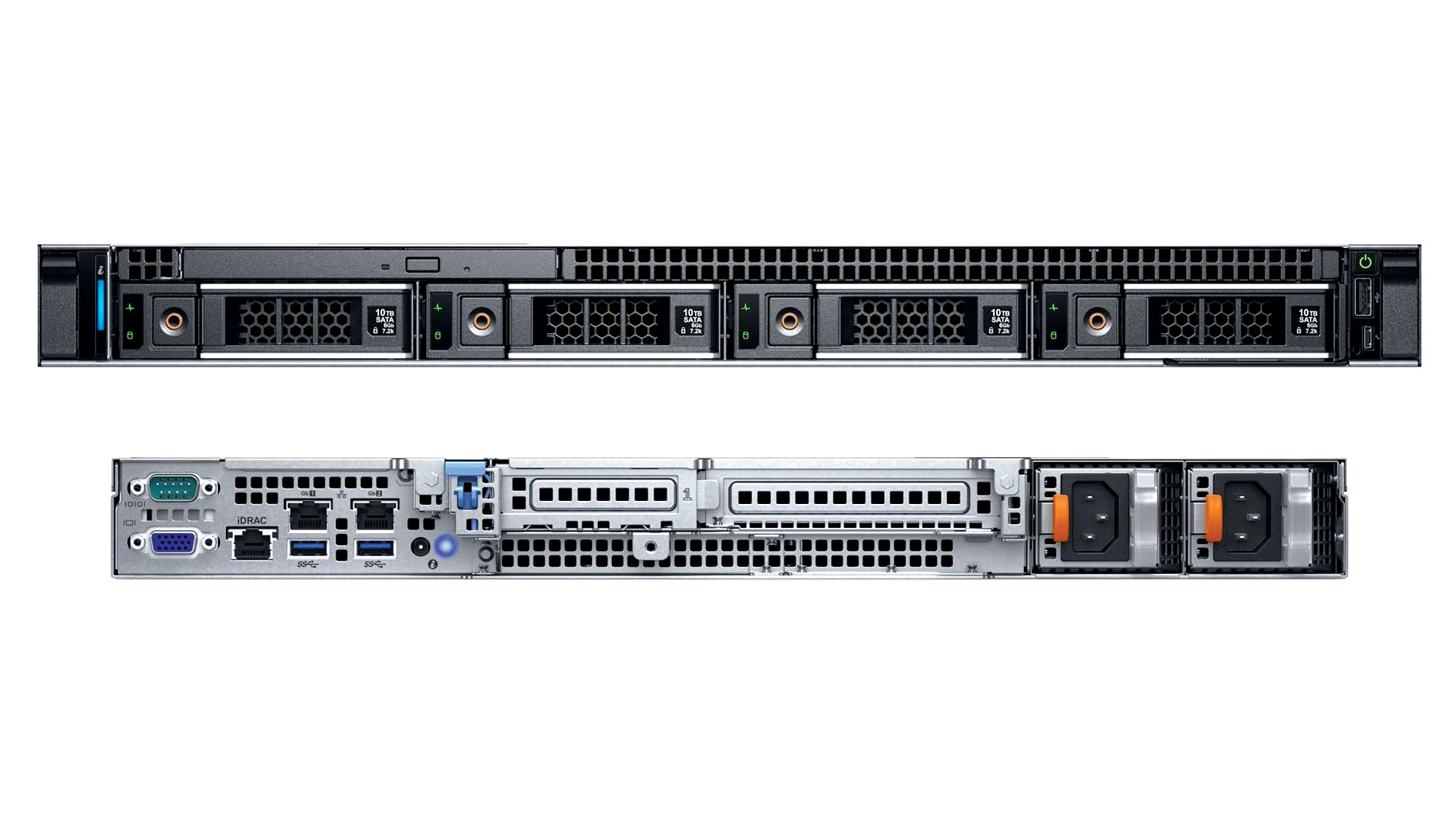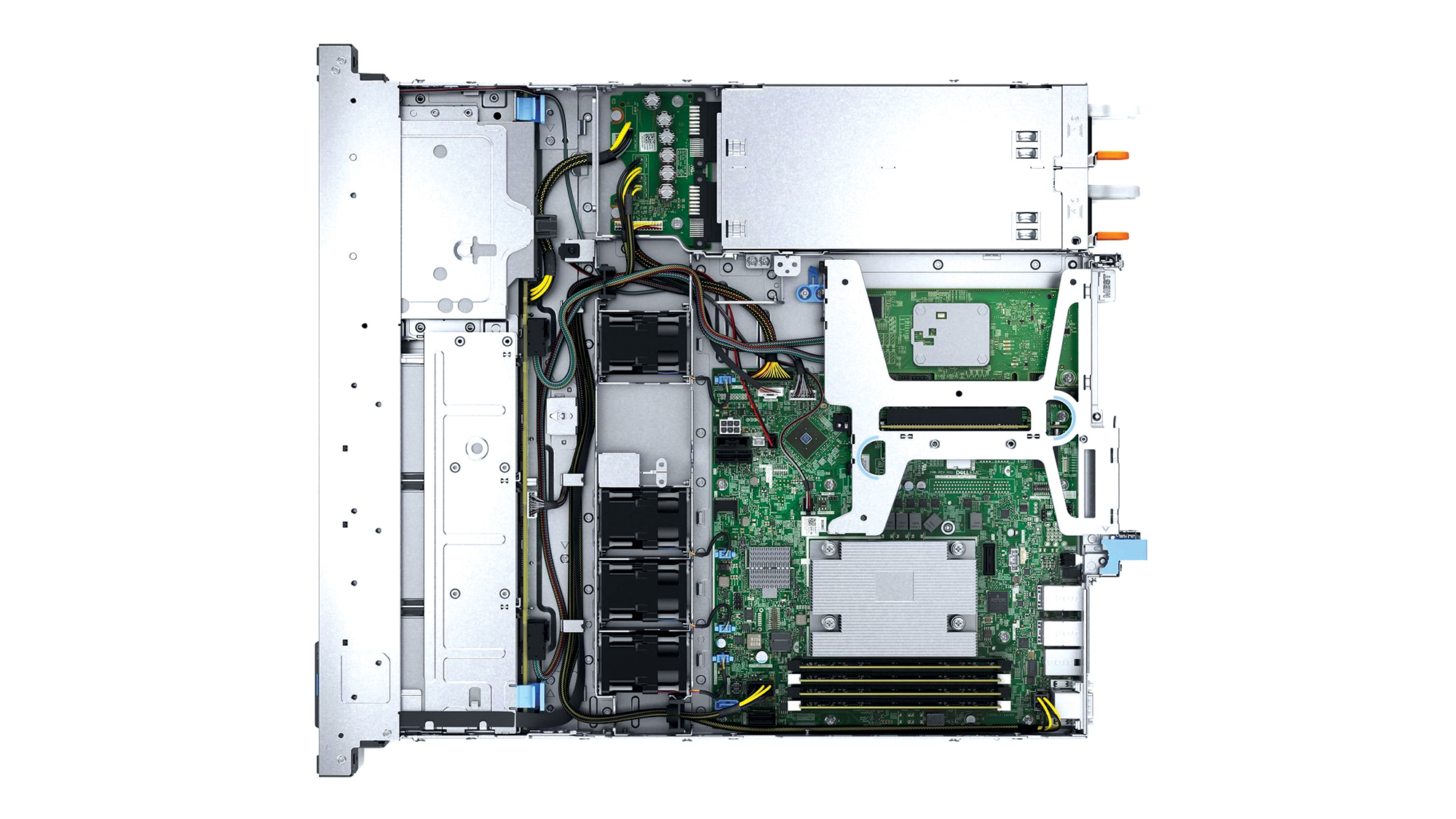Dell EMC PowerEdge R340 review: The only choice for top-notch remote management
A versatile Xeon E rack server with good upgrade potential, plenty of storage choices and the best management features


Dell EMC's PowerEdge R340 offers a great specification at a good price. It has the power and expansion potential to handle demanding business apps and is the only choice if you want the best remote management features on the planet.
-
+
Highly scalable
-
+
Great performance
-
+
Excellent value
-
-
No news on when 128GB RAM will be supported

Dell EMC's foray into the world of Xeon E servers has resulted in a choice of two 1U rack mount models. The entry-level PowerEdge R240 targets small businesses looking for their first server whereas the R340 on review focuses on those that want a scalable solution with more storage options and redundancy.
The budget-priced R240 is only available with 4 LFF drive bays but the R340 goes further, and can be ordered with 4 LFF or 8 SFF hot-swap bays. We have the four bay model which was supplied with two 1TB SATA LFF drives.
RAID options start with the embedded PERC S140 controller which supports SATA drives. Our system puts 12Gb/sec SAS on the table as the price includes a PERC H330 PCI-E RAID card which manages stripes, mirrors and RAID5 arrays.
Dell EMC's BOSS (boot optimized storage solution) PCI-E card does away with the need to put the OS on a hard disk, supporting dual mirrored M.2 SATA SSDs with the 240GB version costing 305. The R340 also supports an internal dual SD module (IDSDM) which has its own dedicated motherboard slot and is designed to run embedded hypervisors.
Power comes into the redundancy equation as the 350W hot-plug PSU we have can be partnered with a second. A spare bay is ready and waiting at the rear and you can specify high-power 550W Platinum PSUs if required.
There's plenty of power on tap, with the fast 3.5GHz 4-core Xeon E-2134 CPU teamed up with 32GB of DDR4 supplied on two 16GB sticks. Maximum memory is 64GB but Dell EMC has yet to indicate when it will offer a BIOS update that allows this to be pushed to 128GB.

The PERC H330 card is installed in a dedicated PCI-E slot on the motherboard leaving both slots in the riser card above free for upgrades. The network is served by two embedded Gigabit ports and if you feel the need for more networking speed, Dell EMC offers a wide range of 10-Gigabit cards.
Sign up today and you will receive a free copy of our Future Focus 2025 report - the leading guidance on AI, cybersecurity and other IT challenges as per 700+ senior executives
CPU and memory cooling is handled by three cold-swap fans with a fourth in front of the expansion slots. The R340 is a quiet customer as the SPLnFFT app on our iPad recorded sound levels of only 44.2dB from a metre in front.
If you want classy remote management features then look no further: Dell EMC's iDRAC9 is simply the best. Its HTML5 web interface delivers a wealth of information on server operations with the Dashboard screen providing a quick view on system and storage health.
The price we've shown includes the iDRAC9 Enterprise upgrade which enables full OS remote control and virtual media services. We used the latter to map a remote Windows Server 2019 ISO to the server and called up the embedded LifeCycle Controller tool to help us install it in 30 minutes.
We use Dell EMC's OMM (OpenManage Mobile) on our iPad but the R340 doesn't support the Quick Sync 2 Bluetooth module for walk-up access. No problem though, as we could remotely monitor the server by entering the iDRAC9 IP address into OMM.
Dell EMC's OpenManage Enterprise 3.1 is also run in our lab as a Hyper-V VM and after discovering the R340, it presented plenty of details on general operations. It also provides fault alerting services, direct access to the server's virtual console, inventory and remote power controls.
The PowerEdge R340 offers a great specification at a good price. It has the power and expansion potential to handle demanding business apps and is the only choice if you want the best remote management features on the planet.
Dave is an IT consultant and freelance journalist specialising in hands-on reviews of computer networking products covering all market sectors from small businesses to enterprises. Founder of Binary Testing Ltd – the UK’s premier independent network testing laboratory - Dave has over 45 years of experience in the IT industry.
Dave has produced many thousands of in-depth business networking product reviews from his lab which have been reproduced globally. Writing for ITPro and its sister title, PC Pro, he covers all areas of business IT infrastructure, including servers, storage, network security, data protection, cloud, infrastructure and services.
-
 Half of agentic AI projects are still stuck at the pilot stage – but that’s not stopping enterprises from ramping up investment
Half of agentic AI projects are still stuck at the pilot stage – but that’s not stopping enterprises from ramping up investmentNews Organizations are stymied by issues with security, privacy, and compliance, as well as the technical challenges of managing agents at scale
By Emma Woollacott Published
-
 What Anthropic's constitution changes mean for the future of Claude
What Anthropic's constitution changes mean for the future of ClaudeNews The developer debates AI consciousness while trying to make Claude chatbot behave better
By Nicole Kobie Published
-
 Microsoft warns of rising AitM phishing attacks on energy sector
Microsoft warns of rising AitM phishing attacks on energy sectorNews The campaign abused SharePoint file sharing services to deliver phishing payloads and altered inbox rules to maintain persistence
By Emma Woollacott Published
